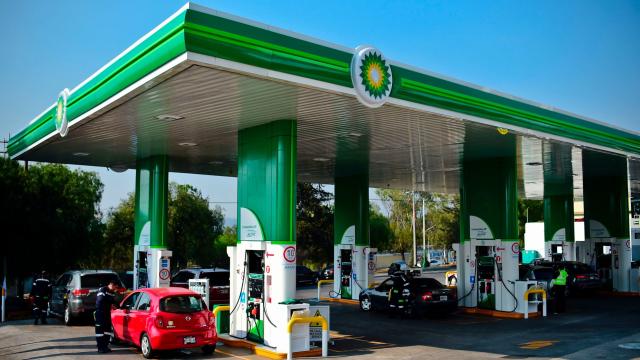BP is saying the quiet part loud: In the 2020 Energy Outlook report the energy giant published this week, it said that the world may have reached peak oil.
The covid-19 pandemic has done a serious number on the oil industry, with demand falling to historic lows amid lockdowns and prices falling into negative territory. In a report on Tuesday, the International Energy Agency warned that for the oil industry, the “path ahead is treacherous,” reducing its forecast for global oil demand in 2020 by 200,000 barrels per day. And on Monday, OPEC lowered its predictions of demand in 2020 by 400,000 barrels per day.
In BP’s new report, analysts said the market may never recover from this damage. The authors lay out three possible scenarios for the world’s energy usage between now and 2050, which illustrate a rapid, moderate, and slow transition to renewables. The first two scenarios show demand for oil steeply falling over the next three decades. But even under the firm’s most “optimistic” scenario for Big Oil where climate action doesn’t accelerate, oil demand will plateau at 2019 levels before declining in 2035.
This is a vastly different picture from the one the firm sketched in its last outlook report just one year ago, which predicted oil consumption would continue to grow over the next decade, peaking sometime in the 2030s.
The report forecasts that while oil demand falls, there will be increased demand for non-fossil-based power. In 2018, fossil fuels currently made up 85% of the world’s energy demand, but by 2050, that could decline to between 20% and 70%, depending on policymakers’ choices. Renewables will make up the difference. As a result, in every scenario BP analysts mapped out, the proportion of renewable energy use will increase more quickly than any fossil-based fuel ever has.
Along with the covid-19 pandemic, the report predicts that increased use of electric vehicles will further dent the world’s demand for oil. International policies to limit the use of plastic, which is made of oil, are also expected to drive demand down even further despite some fossil fuel companies betting big on plastic as a saviour.
The oil giant isn’t planning to sit idly by as the renewable market grows. Last week, it announced that it was purchasing a $US1.1 ($2) billion stake in two offshore wind projects planned for the U.S. And last month, it unveiled plans to cut its fossil fuel output by 40% by 2030, though it should be said, those plans still entail an expansion of natural gas. The company also plans to up its renewable investment portfolio eightfold by 2025 and tenfold by 2030.
BP expects big profits from these ventures: At a meeting with its investors this week, the company’s executives said it plans to make similar returns for its shareholders from renewables as it did from its oil and gas exploration.
BP’s plans raise key questions about what the global transition to clean energy will look like. We’ll need to find ways to take care of laid-off fossil fuel workers, and ensure that new infrastructure for renewables doesn’t get built using abusive labour practices or disrupt the natural world.
That’s why even though building out the renewable sector is vastly better for the planet than expanding fossil fuel extraction and use, BP’s new plans give me pause. The company doesn’t exactly have a great track record on any of these fronts. Its business model is rife with labour abuses and massive pollution — this is the company that brought us the Deepwater Horizon oil spill — and it has a history of bullshitting plans to curb its greenhouse gas emissions. You can bet that left to its own devices, the firm will be willing to continue these unsustainable practices even as it transitions to cleaner power.
As we venture into the post-oil era, it’s crucial that we plan our transition rather than just letting the market decide what happens. We shouldn’t be prioritising private profit in the global transitioning to clean energy. Whether or not BP is right about where the oil market is headed, that’s the part they don’t understand.
